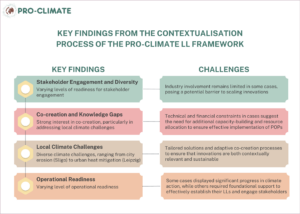 The PRO-CLIMATE project aims to empower communities in adapting to climate change by fostering social transformation, behavioural change, and improved governance. Central to this initiative is the establishment of six Living Labs (LLs) located in Sligo (Ireland), Leipzig (Germany), Badajoz (Spain), Bergen (Norway), Gdańsk (Poland), and Zakynthos (Greece). These Living Labs serve as platforms for co-creation, enabling diverse stakeholders to collaborate in addressing local climate resilience challenges.
The PRO-CLIMATE project aims to empower communities in adapting to climate change by fostering social transformation, behavioural change, and improved governance. Central to this initiative is the establishment of six Living Labs (LLs) located in Sligo (Ireland), Leipzig (Germany), Badajoz (Spain), Bergen (Norway), Gdańsk (Poland), and Zakynthos (Greece). These Living Labs serve as platforms for co-creation, enabling diverse stakeholders to collaborate in addressing local climate resilience challenges.
A baseline assessment was conducted to evaluate the starting conditions and implementation readiness of each Living Lab. This assessment highlights the significant diversity across the six locations, reflecting differences in environmental, social, economic, and institutional contexts. While some Living Labs, such as those in Gdańsk and Zakynthos, display high levels of maturity and progress in climate action, others, including Leipzig, Badajoz, and Bergen, require additional foundational support to establish effective structures and engage stakeholders. The findings reveal that most Living Labs excel in defining objectives and selecting practices relevant to their contexts. However, common challenges include gaps in operational knowledge and expertise in demonstrating systems, evaluating performance, and scaling up solutions. These areas of development are critical to ensuring the long-term success and sustainability of the Living Labs. To address these challenges, the PRO-CLIMATE project emphasises a flexible and adaptive implementation approach, tailored to the unique conditions of each Living Lab. Operational plans will be customized to align with local needs, ensuring meaningful progress toward climate resilience. Capacity-building initiatives will play a pivotal role, including training programs on co-creation methodologies, citizen science initiatives, public awareness campaigns, and strategies to integrate policies and strengthen collaboration among stakeholders. These efforts aim to close knowledge gaps, promote networking and knowledge transfer, and establish robust monitoring and evaluation systems.
Living Labs in the PRO-CLIMATE project are conceptualised as open innovation ecosystems operating in real-life settings. They are characterised by active user involvement, multi-stakeholder collaboration, and iterative feedback mechanisms to create sustainable impacts. The project adopts the Quadruple Helix Model (QHM) to engage key actors from academia, industry, government, and civil society, fostering a systemic approach to climate adaptation. Data management for the baseline assessment adhered to the FAIR principles, ensuring that information is Findable, Accessible, Interoperable, and Reusable. Data collection was conducted through baseline questionnaires and bilateral meetings with Living Lab representatives. Despite these efforts, limitations such as variability in co-creation methodologies, inconsistencies in governance metrics, and potential gaps in baseline data were identified and will be addressed in subsequent phases.
The expertise of the PRO-CLIMATE consortium, spanning research, social transformation, behavioural change, and systems analysis, is strategically distributed across Work Packages to support the Living Labs’ development and sustainability. Addressing capacity-building needs and operational gaps, the project aims to ensure that the Living Labs become effective, long-lasting platforms for climate resilience, contributing significantly to the broader goals of sustainable development.
More information about this work is included in “D2.1 Baseline assessment and knowledge gathering” that was delivered on M12 (December) of the project. The report is public and will be available on our project website as soon as the EC accepts it.
